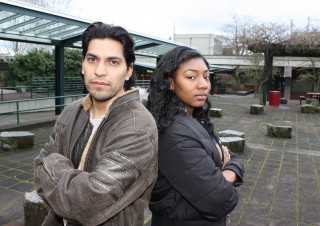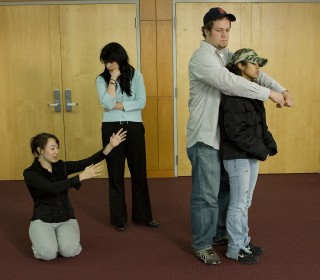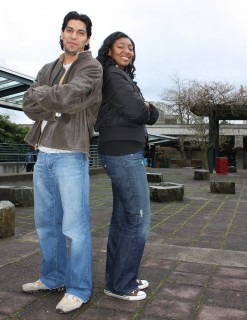This content was published: March 22, 2010. Phone numbers, email addresses, and other information may have changed.
Shining light on racism through interactive theater
Photos and story by James Hill
Twenty-one Portland Community College students are using their personal experiences this academic year to get people to think about racism in a new way and to tackle issues of oppression proactively.
The Illumination Project, in its ninth year, engages and educates audiences through interactive theater all over Portland about the effect of discrimination on ethnic, religious and sexual minorities. The idea is that the audience plays along with the actors in the productions, making it a hands-on experience that has helped better communicate their message.

Fernando Escobedo and Nikoyia Phillips are part of the 2010 Illumination Project, which is in its ninth campaign fighting racism on PCC campuses and in the community.
“It gives you an opportunity to step into the situation and try to make a change as an ally or person being oppressed,” said 21-year-old Illumination Project student Nikoyia Phillips, a resident of Northeast Portland. “You can exercise your skills to be an ally, or if you are part of an oppressed group, then you can learn how to use your skills to better deal with the situation.”
Each year, participants in the Illumination Project explore a topic that becomes their theme for the slate of plays they will produce in winter and spring. This year, the program is focusing on the experiences of immigrants as they try to fit into society.
“It makes a difference,” said Illumination Project student Fernando Escobedo, 30, a native of Mexico and an international student who said he relates to what the plays are trying to do. “When we rehearse we put a lot of emotions into it because it’s our emotions. It’s very realistic. Most of the plays really touch people.”
PROJECT TOUCHES STUDENTS
Escobedo came to the U.S. to learn English after earning a bachelor’s degree in Mexico. He had a difficult time in the beginning because of language differences, which made going to class and relating to his classmates very difficult. But going through the process of the Illumination Project has helped him refocus and become more determined to finish the nursing program.

Jeannie LaFrance (second from left), Illumination Project coordinator, guides a group of students through a play.
“I didn’t have a friend when I started; everyone just comes and goes,” Escobedo said. “I wanted community. In my psychology class our teacher took us to see the Illumination Project. It was very powerful to me. It was about racism and immigration, too, and I thought it was really realistic. It got my heart and my attention. At that point, I thought I should be a part of the Illumination Project.”
The project is going national, expanding beyond PCC and just performances. This spring, the program will publish and nationally disseminate an hour-long DVD and 400-page manual. The DVD and manual guide colleges and universities through the process of developing an Illumination Project on their campus. And the Illumination Project will provide both group training and individual consultation to institutions of higher education, which are interested in creating an interactive theater program on their campus. In addition, staff provided consultation to nearby Portland State University to start the Sexual Assault Education Theater Capstone Class that is based on PCC’s model. The PSU project has been running for the past five years now.
And the Illumination Project fits into the mission and Core Outcomes developed by PCC leaders and faculty. As a result of programs like the Illumination Project, PCC won the National Equity Award from the Association of Community College Trustees for its commitment to fostering a welcoming environment on campus and providing tools and outlets for students of color.
HISTORY
The Illumination Project was founded in 2001 by Deborah Evind, coordinator of the college’s Sylvania Women’s Resource Center; Claire Oliveros, coordinator of the Multicultural Center at the Sylvania Campus; and Jeannie LaFrance, founding director of Act for Action, a nonprofit organization dedicated to the use of theater for education and social justice.
“Deborah and Claire wanted to be able to take the work of their two centers, promoting racial and gender equality, to the greater PCC community through peer education,” said LaFrance, who serves as the Illumination Project coordinator. “The founders of the Illumination Project recognized that faculty members and students on campus were looking for tools to effectively engage in difficult dialogues about issues of oppression.”
To address that need, the three brought forward ideas connected to a kind of theater known as “Theater of the Oppressed,” which is a kind of theatrical approach designed to promote community-centered problem solving.

LaFrance is the driving force for this form of interactive theater at the college and is helping to replicate its style at other universities and colleges.
Since it’s implementation, the Illumination Project performs more than 30 times each year, educating about 2,000 audience members on social justice issues. The majority of the performances occur at PCC, but the group travels to area high schools, outside colleges and local, regional and national conferences. Between 2001-09 the Illumination Project performed 240 times to more than 14,000 audience members. About 87 percent of those surveyed in the audiences stated that they gained skills around intervening in oppressive situations.
“We have had incredible response from our audiences,” she added. “Audience members regularly let us know how much participating in an Illumination Project performance has changed them in profound and positive ways.”
FUNDING
The importance of the Illumination Project has gotten the attention of local and national non-profits seeking to fund innovative programs that make a difference in the community. The Illumination Project has been supported the past eight years through multiple sponsors both on and off the PCC campus. It has received approximately 50 percent of its funding from PCC departments. The other half of the budget has stemmed from grant funding from The Hoover Family Foundation, The Equity Foundation, The Ford Foundation, The Spirit Mountain Community Fund and AmeriCorps’ Oregon Campus Compact.
“In 2006 the Illumination Project was one of 27 higher education institutions that were selected from a field of 675 proposals by the Ford Foundation to receive a $100,000 two-year grant for projects that promote campus environments where sensitive subjects can be discussed,” LaFrance said. “The Illumination Project was then refunded – one of 15 of the original 27 programs – for another $100,000 for an additional two years in 2008.”
THE PLAYS
The funding has helped to touch lives of students, giving them an avenue to educate and create an outlet for their own past experiences with racism. Nikoyia Phillips serves with Escobedo on this year’s Illumination Project. A native of Northeast Portland and graduate of Roosevelt High School, she is in her third year at PCC. Phillips heard about the play at an NAACP meeting and wanted to join.
“It was a different play; it was really engaging, interesting, relevant, and it got me involved,” she said. “It gives me a sense of belonging on the campus and the college. The plays we write are based on our personal experiences and we write about times we have felt oppression in some way. We developed these three plays based on that. For me, going through the plays has shown me different ways how I could have dealt with my own personal situations and different ways I could have spoken out.”
The students put in a lot of work. They meet twice a week to rehearse the plays and attend retreats. The performances, which consist of three plays, are about an hour with discussions afterward. The key, said Phillips, is making sure what they present to the community and to their fellow students are situations they might find in real life.
“It is helpful to people because of how realistic it is,” Phillips added. “We spend a lot of time on that when we going through our plays. I think people will really relate to that. It will shed light on issues people haven’t thought about before. Because present-day racism does exist and oppression does exist, I think for a lot of people they don’t realize it until it’s pointed out to them.”
Escobedo doesn’t need it pointed out to him. In the beginning he wanted to belong to the school and community when he first enrolled at PCC. During his first term he just went to class and went home; he had nobody to hang out with. He said because international students pay so much more than regular students to attend college they are under more pressure to learn, causing stress that others don’t realize and may not even understand. But that changed when he became part of the Illumination Project.
“I’m an international student and it has been hard to fit into the community,” Escobedo said. “This was a real opportunity to become a part of the community. I feel like people can hear my voice now. I now feel I belong at PCC.”
Visit the project on the Web at www.pcc.edu/resources/illumination





